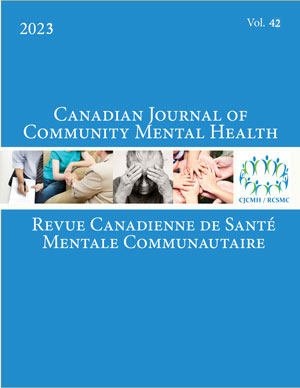Volume 35 • Number 2 • October 2016
Articles
OPEN ACCESS
Cet article traite des personnes atteintes de schizophrénie qui entendent des voix. Il a pour objectif de décrire les croyances qu’elles entretiennent par rapport à leurs voix, le degré d’anxiété qu’elles ressentent et leur perception relativement à leur fonctionnement social. Les stratégies d’adaptation qu’un sous-groupe de l’échantillon déploie sont exposées. Cette recherche s’appuie sur le modèle cognitif ABC qui stipule que les hallucinations auditives sont des événements déclencheurs (A) auxquels les individus donnent un sens en construisant un système de croyances (B) pouvant entraîner des réactions émotionnelles et comportementales (C). Les analyses statistiques montrent que les personnes rapportant des voix omnipotentes plus fortes ont tendance à y résister davantage sur le plan émotionnel et à avoir un moins bon fonctionnement social. Les personnes qui résistent à leurs voix ont tendance à démontrer un degré d’anxiété plus élevé. Les analyses qualitatives font ressortir un consensus à l’effet que prendre sa médication et se distraire des voix sont les stratégies jugées les plus faciles à réaliser et les plus efficaces pour composer avec elles.
OPEN ACCESS
L’objectif de cette étude est de déterminer les priorités d’action afin d’améliorer l’offre de services de santé mentale suite à un traumatisme craniocérébral (TCC) modéré ou grave. Quatre-vingts participants (intervenants et intervenantes, décideurs et représentants et représentantes de la communauté) ont participlé au forum de discussion. Un logiciel d’analyse qualitative des énoncés de la démarche réflexive (Démarche réflexive d’analyse en partenariat : DRAP) a été utilisé pour recueillir et analyser les énoncés (Boudreault et Kalubi, 2007). Les participants (hommes et femmes) devaient évaluer l’importance de chaque énoncé (incontournable, nécessaire, souhaitable). Un total de 341 énoncés ont été proposés dont 70,3 % ont été jugés comme étant incontournables dans le secteur des pratiques cliniques, 63,2 % dans le secteur des politiques, 50,7 % et 66,6 % dans les secteurs organisation des services et formation respectivement. Cette activité de réflexion provinciale en partenariat propose un plan d’action afin d’améliorer l’offre de services en santé mentale suite à un TCC modéré ou grave.
OPEN ACCESS
Researchers examined how young people who are homeless conceptualize and interact with challenging circumstances, adopting a human agency focus rooted in the constructionist model of resilience. Thirty-five young people who were homeless in Ottawa participated in in-depth interviews and/or focus groups. Participants reflected upon their strategic decision-making and described how they solved problems in the midst of adversity, planned for the future, consciously altered their identities, and balanced the costs of engaging in certain behaviours. A constructionist approach to resilience allowed for insight into behaviour that is often seen as risky or outside social norms.
OPEN ACCESS
This paper reports on the development and evaluation of the Depression Self-Management Workshop (DSMW) that aims to empower participants to implement self-management behaviours in their daily lives in order to improve their mental health and prevent relapse. The 10-session intervention was delivered to 46 adults with depression who completed pre-, post- and follow-up structured interviews and questionnaires. Depressive symptoms were significantly reduced at the end of the intervention and at follow-up. Improvements in participants’ knowledge about depression, self-management behaviours and self-efficacy were also observed. These results were corroborated by the participants’ strong convictions regarding the DSMW’s usefulness.
OPEN ACCESS
Clinicians completed interviews using the Ohio State University Traumatic Brain Injury Identification Method (TBI-ID) and sections of the Addiction Severity Index (ASI-Lite) with clients who were homeless and receiving community mental health services. Fifty-six percent of clients screened positive for TBI. Clients with a history of TBI were more likely to be using multiple substances, and were more likely to have, and be bothered by, family and emotional problems than clients without TBI. Homeless clients receiving mental health services may have undiagnosed TBI that could affect their ability to benefit from treatment. Such clients may require services that compensate for their cognitive deficits.
Practice Innovations
OPEN ACCESS
Going Off, Growing Strong is a program for Inuit youth facing widespread social, cultural, and economic change. The overarching goals of the program are to: (1) enhance resilience and wellness; (2) build social connections for the youth; and (3) transmit traditional knowledge, skills, and values to participating youth.
OPEN ACCESS
Cognitive behavioural therapy-based music (CBT-Music) group is a nine-week guided self-help group for individuals with mild-to-moderate symptoms of anxiety and/or depression. This is a novel treatment developed for use in a community-based mental health setting. A feasibility study (a randomized control trial) has shown promising results for the CBT-Music group.










